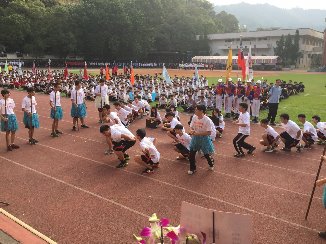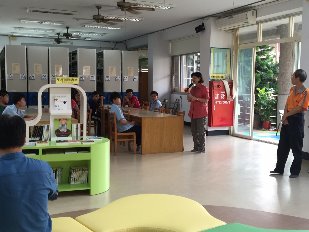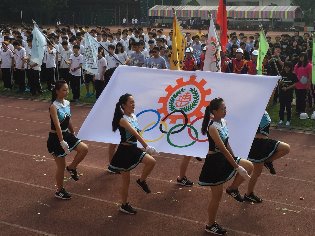Courses Planning
1. Planning Ideas
Vocational education has long been playing a vital role on skillful work forces, and it has contributed to Taiwan’s economic development a lot for 50 years. It is courses planning design and development that play pivotal role on the whole vocational educational development.
The present vocational high school courses standard is issued in 1998, and it has been being implemented until now. All kinds of courses content overlap and cannot be joined in a vocational educational system. Accordingly,“ nine-year-consistent courses ”was carried on in junior high schools in 2002. In order to link up courses of vocational high schools new students in 2005, the Ministry of Education(MOE) planned to complete the“ Vocational High School Courses Platform Draft ”in 2002, and amend “Vocational High School Departments Courses Temporary Platform ”in 2004. This vocational high school new courses temporary platform has been issued in February, 2005. It was practiced formally in 2006.
This temporary platform of courses divides departments of vocational high schools and special courses of comprehensive high schools into 15 departments. Each department plans courses platform by its own courses development committee. The required courses of the courses platform by the MOE include only general and professional subjects. It will be implemented formally in 2018, and it will leave developing space for school management and courses planning. Vocational high schools can create their features as they run schools and help students with adaptability.
According to the essence of “ 12-year National Basic Education Courses General Platform”, basis of developing strategies of school background analysis, our school courses planning ideas follows:
The courses development of essence of 12-year National Basic Education is based on holistic education. Ideas are “ autonomous”, “interact”, and “good for all”, and emphasize that students are active learners. School education should guide students learning motif and passion, lead students to show their interactive abilities with others, society, nature, and culture, and then seek each other’s benefits and advantages.
Thus, the vision of this platform are to “ accomplish every student’s adaptability and lifelong learning”, to take care of individual’s special needs, to respect multiculturalism, ethnic differences, and to care vulnerable groups.
From presenting life itself, and through adaptable education, it inspires student’s joy of life and confidence in life. It rises student’s learning strive and courage of innovation. It makes students to take world responsibilities , and show the wisdom of co-existence. It lets students become lifelong learners of social adaptability and reactive ability, and then a person or a group of people can look forward to living better and leading a better life.
2. General Courses Aims
(1). Inspire life potential. Start learning motif. Cultivate curiosity, exploring ability, thinking ability, judging ability, and replying ability. Be willing to explore and learn at positive attitudes and with constant energy. Experience the joy of learning. Increase self-value, inspire more life potential to reach healthy and balanced holistic development.
(2). Cultivate life intelligence. Develop basic knowledge. Merge what have learned from every field in the daily life. Integrate hands and mind to solve problems. Be able to communicate and express properly. Emphasize human relationship, team cooperation, the social interaction to adjust social life. Be brave to innovate and show the conservations of technological application and life beauty.
(3). Speed career development. Guide adaptability development. Show advantages and learn how to learn. Build lifelong learning will and abilities. Inspire continuing learning, innovative and progressive energy. Base on academic research or professional skills, form labor respecting concepts. Temper the courage, intelligence of career challenging, international competing and collaboration, in order to adjust social change and world trend, and be willing to try , lead the changing trend.
(4). Converse civil responsibilities. Root democratic accomplishment, nomocratic concepts, moral courage, community and tribal awareness, national identity, and international understanding. Learn self-responsibility, further respect multi-culturalism and ethnic differences. Seek social justice. Deepen global citizenship, love nature, and cherish life. Care for and act in conserving resources. Devote oneself to ecological sustainable cultural development and co-existing living ideas.
3. Core Accomplishment
(1). Autonomous action:
Emphasize personal learning subjectivity. Learners should be able to choose proper learning methods, systemically think to solve problems, have both creativity and active ability. In social situation, learners can self-manage, adopt proper acts to rise physical and mental conditions and make themselves progress.
(2). Intercommunication:
Emphasize that learners can widely operate all kinds of apparatus to interact with others efficiently. These apparatus contain material tools and social cultural tools. The former ones are artificial material (ex. Instructional material, learning tools, stationery, toys, etc.), technology (including assistant technology) and information, the later are language (oral, sign language), words, and math signs. Instead of passive media, tools are positive interactive ways between human and environment. Besides, art is also an important communicative tool. People should have art accomplishment and sense of beauty in life, and make use of these tools.
(3). Social participation:
Emphasizing in a closely connecting global village, learners need to learn how to handle social pluralism to participate in actions and build proper cooperation model and human relationship with others. Everyone needs ways of participation to develop the accomplishment of people or group interaction to rise all human life qualities. Social participation is not only a social accomplishment but also a kind of awareness.